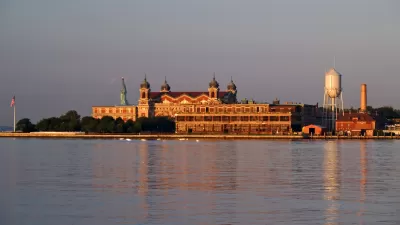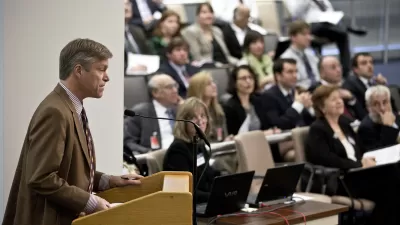All planners encounter passionate obstructionist activity at some point. While the reasoning for anti-development is often discussed, it's still not a widely understood force in the planning process and the evolution of cities.

New research from Paavo Monkeonen and Michael Manville at the University of California, Los Angeles shed light on the nature of community opposition to proposed developments. That kind of insight is valuable to anyone who tasked with listening and responding to the concerns of members of the public, like planners, or have a critical project to deliver through the approvals process, like planners.
The primary question posed by the new research paper published for free online by Monkkonen and Manville is about the cause of anti-development sentiment. The researchers surveyed 1,300 residents of Los Angeles County "to measure the relative power of different arguments against new housing." Respondents were questioned about common anti-development arguments, like traffic congestion, neighborhood character, and strained local services, and also introduced the idea that people might not like development "because they do not like developers."
The key finding of the report is strong evidence that much anti-development sentiment is actually anti-developer sentiment. According to the study's abstract, "opposition to new development increases by 20 percentage points when respondents see the argument that a developer is likely to earn a large profit from the building."

Planetizen Federal Action Tracker
A weekly monitor of how Trump’s orders and actions are impacting planners and planning in America.

San Francisco's School District Spent $105M To Build Affordable Housing for Teachers — And That's Just the Beginning
SFUSD joins a growing list of school districts using their land holdings to address housing affordability challenges faced by their own employees.

The Tiny, Adorable $7,000 Car Turning Japan Onto EVs
The single seat Mibot charges from a regular plug as quickly as an iPad, and is about half the price of an average EV.

With Protected Lanes, 460% More People Commute by Bike
For those needing more ammo, more data proving what we already knew is here.

In More Metros Than You’d Think, Suburbs are Now More Expensive Than the City
If you're moving to the burbs to save on square footage, data shows you should think again.

The States Losing Rural Delivery Rooms at an Alarming Pace
In some states, as few as 9% of rural hospitals still deliver babies. As a result, rising pre-term births, no adequate pre-term care and "harrowing" close calls are a growing reality.
Urban Design for Planners 1: Software Tools
This six-course series explores essential urban design concepts using open source software and equips planners with the tools they need to participate fully in the urban design process.
Planning for Universal Design
Learn the tools for implementing Universal Design in planning regulations.
Smith Gee Studio
City of Charlotte
City of Camden Redevelopment Agency
City of Astoria
Transportation Research & Education Center (TREC) at Portland State University
US High Speed Rail Association
City of Camden Redevelopment Agency
Municipality of Princeton (NJ)




























